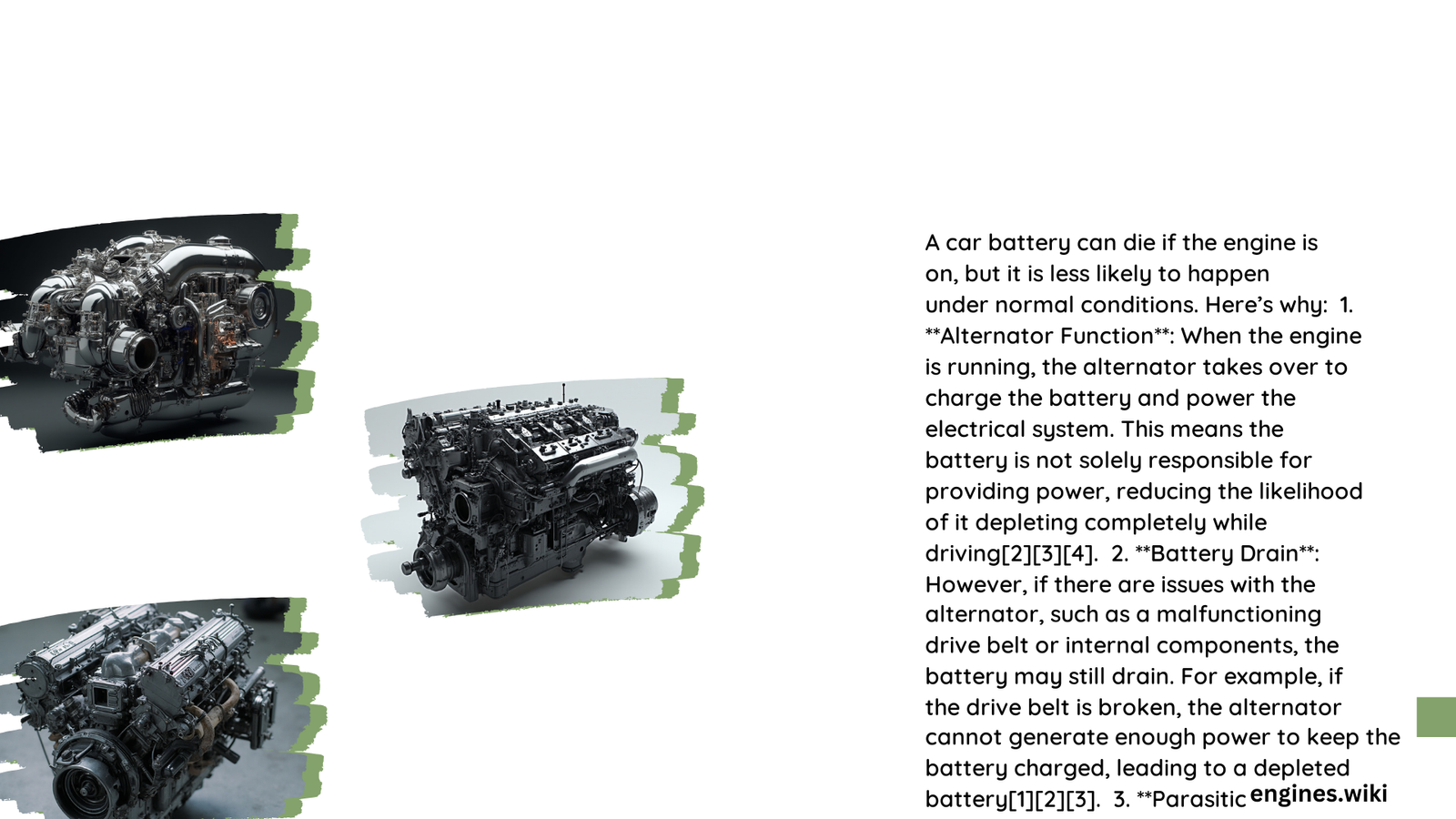When the car engine is running, the alternator continuously charges the battery, preventing it from dying. The alternator generates electricity to power the vehicle’s electrical systems and maintain the battery’s charge. Under normal circumstances, a car battery will not die if the engine is on, as the alternator provides sufficient power to keep the battery charged and support the vehicle’s electrical needs. However, factors such as battery age, electrical system issues, or extreme conditions can affect this process.
What Happens to the Car Battery When the Engine Is Running?
When the engine is running, the alternator takes over as the primary power source for the vehicle’s electrical systems. Here’s what occurs:
- The alternator generates electricity, typically producing between 13.5-14.5 volts.
- About 12 volts are used to run the vehicle’s electronics.
- The remaining 1.5-2.5 volts serve as a maintenance charge for the battery.
This process ensures that the battery remains charged while the engine is running, preventing it from dying under normal circumstances.
Can a Car Battery Die Even If the Engine Is On?

While it’s uncommon, there are situations where a car battery might die even if the engine is running:
- Faulty Alternator: If the alternator fails, it won’t charge the battery properly, leading to battery drain even when the engine is on.
- Excessive Electrical Load: If the vehicle’s electrical demands exceed the alternator’s capacity, the battery may gradually discharge.
- Extreme Temperatures: Very hot or cold conditions can affect battery performance and charging efficiency.
- Old or Damaged Battery: An aging or damaged battery may not hold a charge effectively, even with a functioning alternator.
How Long Can a Car Idle Without Draining the Battery?
A car can typically idle for extended periods without draining the battery, as long as the alternator is functioning correctly. However, prolonged idling can have other negative effects:
- Increased fuel consumption
- Unnecessary wear on engine components
- Environmental impact due to emissions
It’s generally recommended to avoid excessive idling for these reasons, rather than concerns about battery drain.
What Are the Signs of a Failing Car Battery?
Even with the engine running, a failing battery may exhibit certain symptoms:
- Dim headlights or interior lights
- Slow or struggling engine start
- Electrical system issues (e.g., power windows operating slowly)
- Dashboard warning lights
- Swollen battery case
- Corroded battery terminals
If you notice these signs, it’s advisable to have your battery and charging system checked by a professional.
How Does the Alternator Affect Battery Life?
The alternator plays a crucial role in maintaining battery health:
| Alternator Function | Impact on Battery |
|---|---|
| Charges battery while engine runs | Prevents battery drain |
| Supplies power to electrical systems | Reduces strain on battery |
| Maintains consistent voltage output | Ensures proper battery charging |
| Regulates electrical current | Protects battery from overcharging |
A properly functioning alternator significantly extends battery life by preventing excessive discharge and ensuring optimal charging conditions.
What Factors Can Lead to Battery Failure Despite a Running Engine?
Several factors can contribute to battery failure even when the engine is on:
- Electrical System Malfunctions: Short circuits or parasitic drains can deplete the battery faster than the alternator can recharge it.
- Alternator Belt Issues: A loose or damaged belt may prevent the alternator from functioning efficiently.
- Extreme Weather Conditions: High temperatures can cause battery fluid evaporation, while cold temperatures can reduce charge capacity.
- Battery Age and Quality: Older batteries or those of inferior quality may fail prematurely.
- Frequent Short Trips: Short drives may not allow sufficient time for the alternator to fully recharge the battery.
How Can You Prevent Car Battery Drain?
To minimize the risk of battery drain, consider these preventive measures:
- Regularly check and maintain your battery and electrical system
- Avoid leaving electrical accessories on when the engine is off
- Ensure proper alternator function through routine inspections
- Use a battery maintainer for vehicles that sit idle for extended periods
- Keep battery terminals clean and connections tight
- Replace old batteries before they fail completely
What Should You Do If Your Car Battery Dies While Driving?
If your car battery dies while driving, follow these steps:
- Safely pull over to the side of the road
- Turn on hazard lights if possible
- Try to restart the engine
- If unsuccessful, call for roadside assistance
- Have the battery and alternator checked by a professional
Remember, a battery dying while the engine is running often indicates a more serious issue with the vehicle’s charging system.
How Often Should You Replace Your Car Battery?
The lifespan of a car battery can vary, but general guidelines suggest:
- Most batteries last 3-5 years
- Factors like climate, driving habits, and vehicle type can affect longevity
- Regular testing can help predict when replacement is necessary
- Consider proactive replacement around the 3-year mark in extreme climates
Regular maintenance and awareness of your battery’s age can help prevent unexpected failures.
In conclusion, while a car battery typically won’t die if the engine is on due to the alternator’s charging function, various factors can still lead to battery issues. Regular maintenance, awareness of warning signs, and proper vehicle care can help ensure your battery remains healthy and functional, even during extended periods of engine operation.
